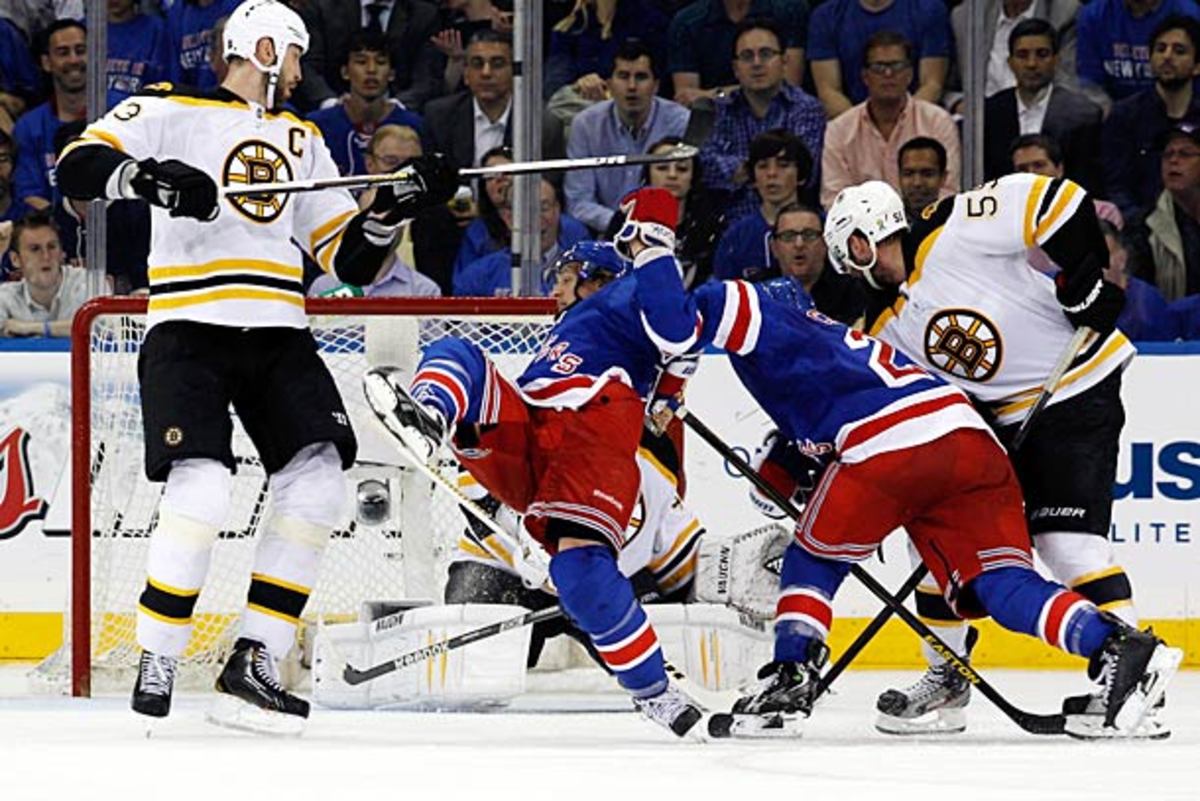
NHL playoffs: New York Rangers' power play woes fall on John Tortorella
Carl Hagelin (center) took an undeserved shot from his own coach for his power play deficiencies. (Getty Images)
Hold it. Tell that driver not to move the New York Rangers' bus. Carl Hagelin is still under it. Coach John Tortorella tossed him under it after losing Game 1 of New York’s series against the Boston Bruins when he was asked why Hagelin, a talented offensive forward, wasn’t seeing much ice time on the power play. “Because he stinks on the power play,” Tortorella replied in his customary unvarnished fashion. “I don’t know why. I wish I could play him on the power play. Every time I put him on, he stinks.”
Tortorella went on to elaborate about exactly why Hagelin wasn’t as proficient a contributor on the power play as he has been in even-strength situations, and at least some of the explanation made good sense. “I think he’s too quick,” the coach said. "I think he’s a jitterbug and he screws it up. But I may use him. I’d love to. And I’m not trying to be a smart ass. He stinks on the power play every time I put him out there.”
When Hagelin was asked about his coach's pearly words, he answered, “I don’t really have comments. All I can say is I don’t stink.” Asked if the remarks surprised him, he added, “Yeah, I haven’t really been on the power play.”
During the next match, a 5-2 Ranger loss in Game 2, Hagelin spent 46 seconds on the power play. In Game 3, he was on the power play for a minute and 45 seconds. Meanwhile, the Rangers ran their man-advantage futility streak to 0-for-10 in the series while falling into a precipitous 0-3 hole against Boston.
GAME 3: Recap | Boxscore| Highlights | Complete postseason schedule
Yes, Hagelin is a speedster and most of the offense on a typical power play is not generated with speed, but through quick passes, deft shots and patient decision-making in what are more and more frequently a series of set plays that attempt to break down a defense without a great deal of improvisation. Hagelin is therefore like a basketball player who might be adept at running a fast break, but not necessarily a pick and roll. He simply isn’t able to use his greatest skill, his speed, in a game situation that rewards smart adherence to structure rather than creativity in transition. He has one power play goal in 112 career regular-season games and none in 27 playoff games, though much of that is because he rarely gets shifts in man-advantage situations.
Okay, that makes sense. But why must Tortorella use the language he did when placing blame squarely on his impressionable player who, by all accounts, including those of his teammates, is working as hard as he can to improve and contribute? And at what point might it be time for a coaching staff to accept some responsibility for a power play that ranked 23rd in the league during the regular season despite having the likes of Rick Nash, Ryan Callahan, Brad Richards and, for part of the year, Marian Gaborik? Tortorella has tried using forwards at the point, and putting big bodies, such as Brian Boyle, in front of the net. Does everybody out there stink, since the club only has two goals in 38 chances on the power play during the playoffs?
Even if you feel a player isn’t producing, what’s wrong with an answer such as: “For all his speed and skills, his assets haven’t translated as effectively on the power play as they have at even strength.” That says the same thing, but with more respect for a player who is clearly trying to improve his game and has in many areas.
Hagelin is only 24. Tortorella doesn’t owe him the sort of respect that a player owes a coach, and to be fair, Tortorella did go on to praise other aspects of Hagelin’s game later during the press conference. But a private pep talk, even with the kind of tough evaluations that a player may not want to hear, is one thing; a public undressing should be reserved for a player who quits on his team or simply doesn’t try (Petr Nedved, anyone?), not for a second-year player who is still trying to develop an aspect of his game that is lagging behind other areas.
"Stinks" is a strong word, sort of like the difference between saying a bite of food isn’t quite for your tastes and saying it’s so putrid that you wouldn’t serve it to a dog. Say what you want to his face, but at least in public, critique him with a little more restraint. Whether Tortorella bears some responsibility for Hagelin’s -- and the team’s – slump with the man advantage is one thing, but he most certainly does carry some responsibility for helping his players to get out of it.
[si_cvp_video id="video_0A8E965F-A264-8D1C-ECE6-CA4AC633E0AA"]
































